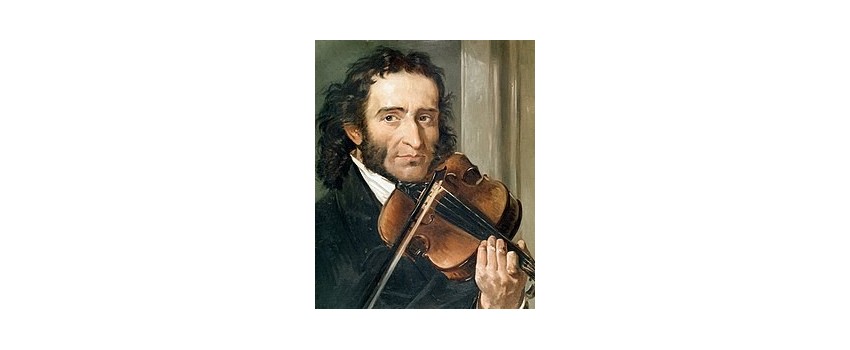Paganini Moses-Fantasie for violin and piano (Schott)
Paganini Moses-Fantasie for violin and piano (Edition Schott)
Niccolo Paganini was born in Genoa, Italy, in 1782. His father, Antonio Paganini, was a successful trader and amateur musician who recognized his son's musical talent early on. Niccolo's mother, Teresa Bocciardo, was also musically gifted and played the mandolin. As a child, Niccolo showed prodigious ability on the violin, and his father began teaching him the instrument at the age of five. By the time he was seven, Niccolo was performing in public, and his father arranged for him to study with some of the best violinists in Italy.
Despite his early success, Niccolo's childhood was not easy. His father was a strict disciplinarian who pushed his son relentlessly, and Niccolo's health suffered. He was frequently ill and suffered from chronic pain, which some biographers speculate was due to a genetic disorder or childhood rheumatism. Despite these challenges, Niccolo persevered, and his talent continued to grow.
Early Life and Musical Education
At the age of 13, Niccolo was appointed the first violinist of the Republic of Lucca's orchestra, and he soon began to attract attention for his virtuosity and showmanship. However, his career hit a setback when his father was accused of embezzlement and fled to avoid arrest. Niccolo was left on his own, and he struggled to make ends meet. He began to travel and perform as a soloist. Still, his reputation suffered due to rumors that he was involved in occult practices and had sold his soul to the devil in exchange for his musical abilities.
In 1813, Paganini went to Vienna, where he met the composer Franz Schubert. Schubert was impressed by Paganini's playing and wrote a piece for him, which Paganini premiered in 1816. Over the next few years, Paganini continued to tour Europe, performing in France, Germany, and England. His concerts were hugely popular, and he quickly became one of his time's most famous and sought-after musicians.
Paganini's Unique Style and Techniques
Paganini was renowned for his technical virtuosity on the violin, which included lightning-fast runs, complex fingerings, and feats of previously thought-impossible dexterity. He also developed a unique style of playing that emphasized the use of harmonics and double stops, which allowed him to create a richer and more varied sound than other violinists of his time.
Paganini's playing could have been more technically impressive, however. He was also a consummate showman who knew how to captivate audiences with his dramatic stage presence and dazzling costumes. He often played with a silver string, which he claimed was made from the hair of his dead lover. He also frequently broke strings during his performances, which he would replace on stage while continuing to play, further adding to the drama and spectacle of his concerts.
The Myth and Legend of Paganini's Supernatural Abilities
Paganini's reputation for otherworldly abilities and supernatural powers only added to his mystique. Stories circulated that he could play so fast that his fingers became a blur, he could make his violin sing like a human voice, and he could control the elements with his music. Some even claimed he was a sorcerer who had sold his soul to the devil.
Many of these stories were likely exaggerated or invented out of thin air. Still, they speak to the enduring fascination that Paganini's music and persona have held for generations of musicians and audiences. His legacy as a virtuoso and innovator continues to inspire and influence musicians today, and his music remains as captivating and exciting as ever.
Paganini's Compositions and Legacy
Paganini composed over 140 works for the violin, including 24 caprices for solo violin that are still considered some of the most challenging and technically demanding pieces in the classical repertoire. He also wrote numerous concertos, sonatas, and other works for violin and orchestra.
Paganini's legacy as a composer and performer has been profound. His innovations in violin technique and his unique playing style paved the way for later virtuosos like Franz Liszt and Sergei Rachmaninoff. His music has been performed and recorded by countless musicians, and his influence can be heard in everything from heavy metal to film soundtracks.
Controversies and Scandals in Paganini's Life
Despite his success as a musician, Paganini's personal life was often tumultuous. He was known for his extravagant lifestyle, which included gambling, drinking, and womanizing. He also had a reputation for being difficult to work with and was notorious for canceling concerts at the last minute.
Paganini's health continued to be a concern throughout his life. He suffered from various ailments, including tuberculosis, eventually leading to his death in 1840 at 57. After his death, his body was not immediately buried due to fears that he had made a pact with the devil, and his remains were eventually interred in a cemetery in Parma, Italy.
Conclusion
Niccolo Paganini's life and music are shrouded in mystery and legend, but his talent and virtuosity as a violinist are undeniable. From his early childhood in Italy to his rise to fame as a traveling virtuoso, Paganini's life was marked by extraordinary achievements and personal struggles. Despite the controversies and scandals surrounding him, his music continues to inspire and captivate audiences worldwide. Whether you're a seasoned classical music fan or simply curious about one of the most intriguing figures in musical history, the life and music of Niccolo Paganini are well worth exploring.

Paganini Moses-Fantasie for violin and piano (Edition Schott)
Paganini’s Moto Perpetuo for Violin, arranged by Kreisler and published by IMC, is a dazzling, high-speed showpiece designed for advanced violinists seeking to showcase their virtuosity.
Highlights:
• Famous perpetual motion classic
• Kreisler’s renowned arrangement
• Demanding, energetic, and ideal for recitals